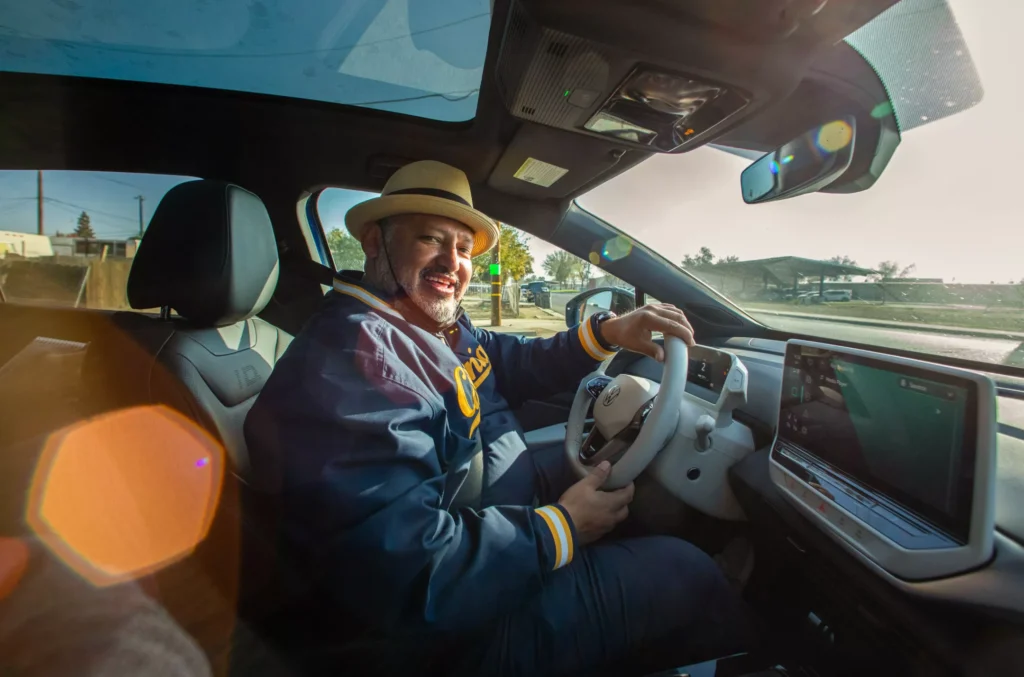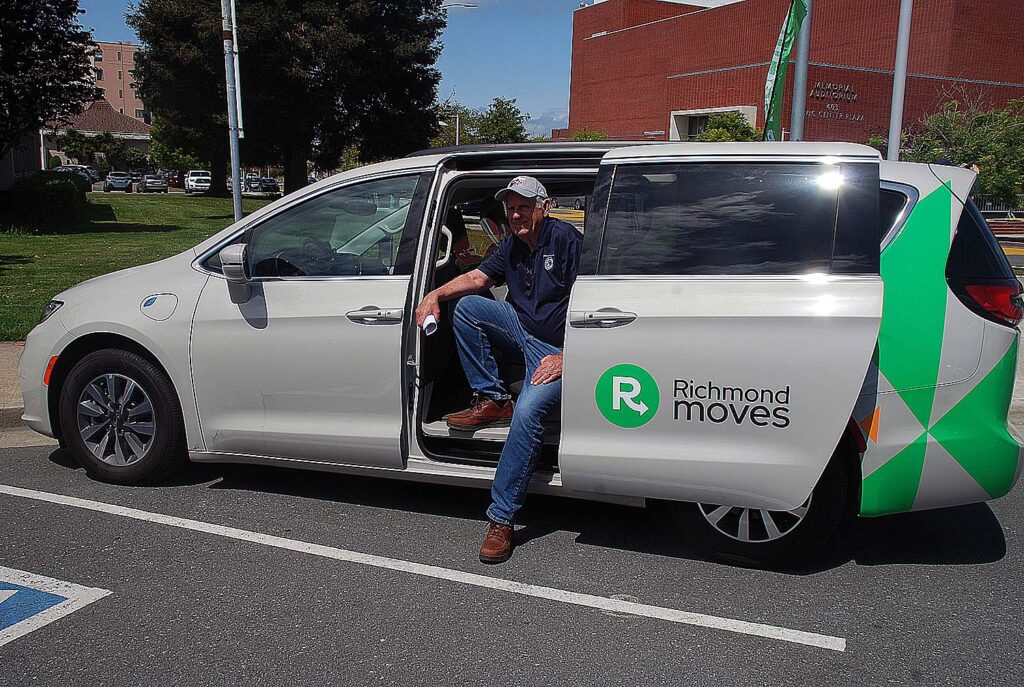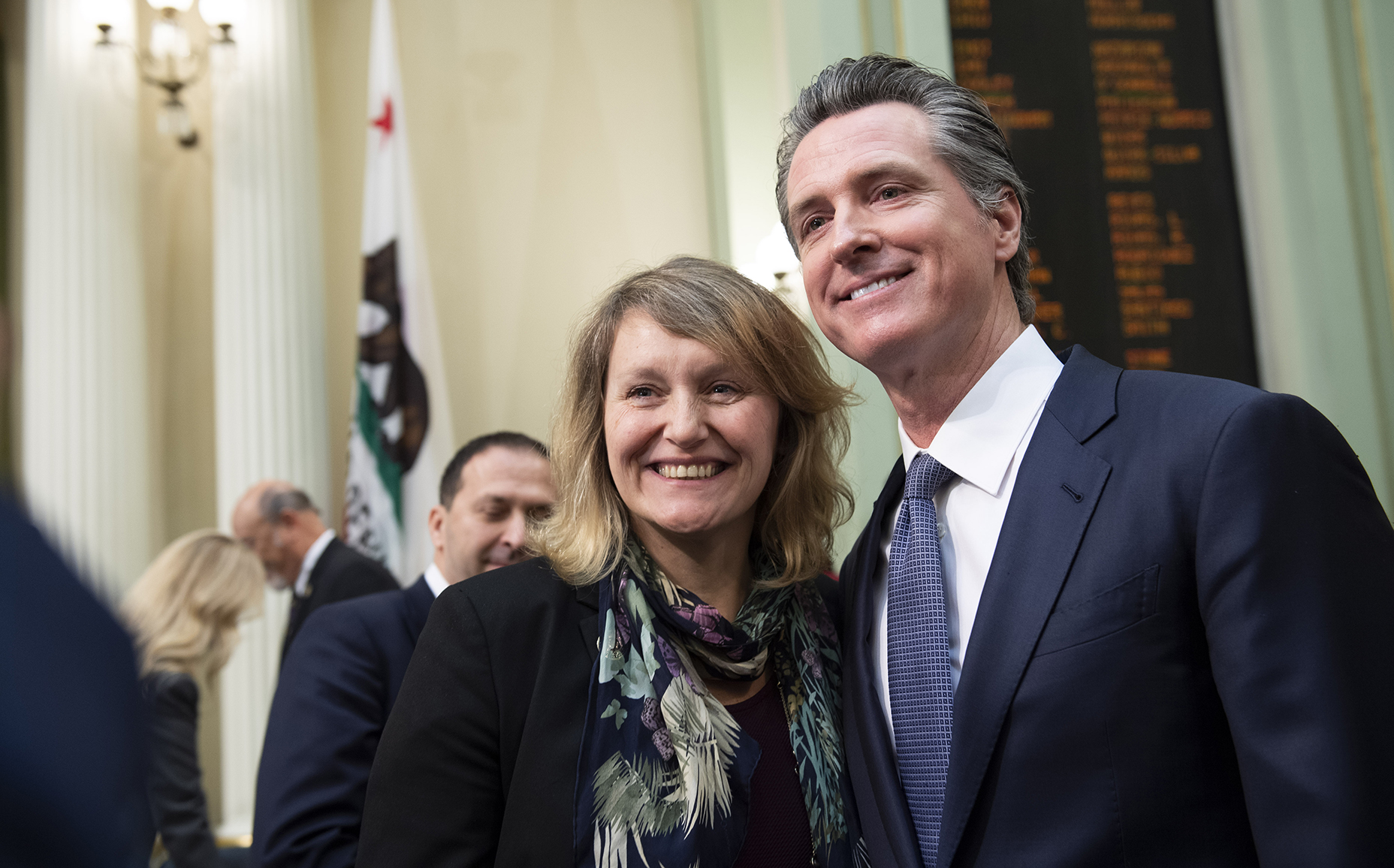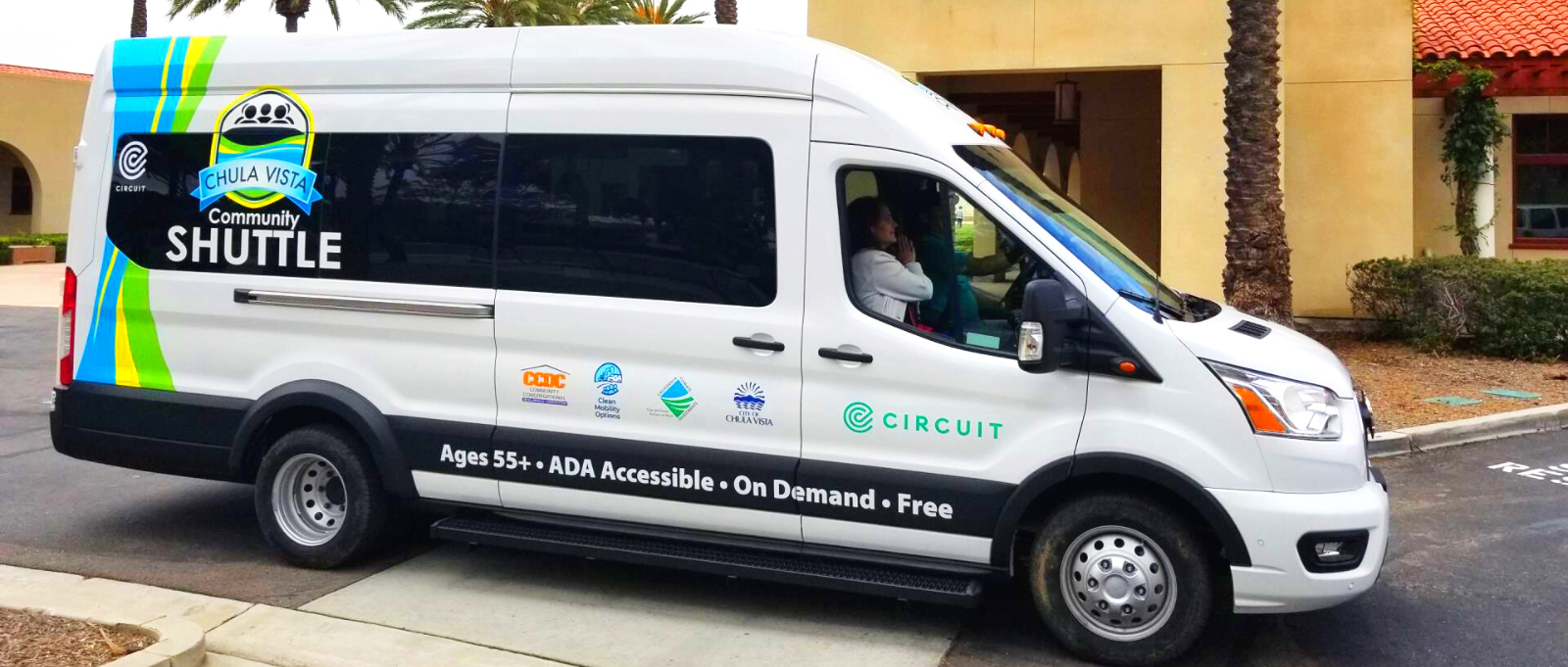October 29, 2022
Topic
The Central Valley city of Huron made national news earlier this year with its creative Green Raiteros program. With a growing fleet of electric vehicles, the program offers residents free rides throughout Fresno County. EVgo, a Los Angeles-based network of EV charging stations, supported the program by installing charging stations in both Huron and Fresno.
A 2020 case study from the Shared-Use Mobility Center and the Latino Environmental Advancement & Policy (LEAP) Institute describes the program:
Described as an “indigenous Uber,” a raiteros system is an informal ridesharing service that consists of volunteer drivers, often retired or semi-retired neighbors, who offer rides to people who lack auto or other mobility options.

Huron Mayor Rey León has been a driving force behind a number of revitalizations to the built environment and mobility in the city, and this latest effort has even caught the attention of the Biden Administration. As the nation builds out EV charging infrastructure and seeks to find innovative solutions to climate change, social equity, public health, and transportation challenges, Green Raiteros is an example of the kind of transformative thinking that can make a tangible impact on residents’ lives.
About the Clean Mobility Options Program
The Green Raiteros program received a portion of its funding from Clean Mobility Options (CMO), a statewide public program that empowers under-resourced communities across California to overcome mobility obstacles. The program seeks to increase mobility choices for all Californians—particularly marginalized communities, low-income communities, and Tribes—with funding for community needs assessments and clean, shared, zero-emission transportation projects such as:
- Carsharing
- Bikeshare or scootershare
- Carpooling and vanpooling
- Microtransit
- Fixed-route transit
- Ride-on-Demand
CMO is part of California Climate Investments, a statewide initiative that puts billions of Cap-and-Trade dollars to work reducing greenhouse gas emissions, strengthening the economy, and improving public health and the environment. CivicWell is proud to be part of the CMO Statewide Administrator team selected by the Air Resources Board, along with CALSTART and the Shared-Use Mobility Center.
CMO is also a California Energy Commission Clean Transportation Program, which is investing more than $1 billion to accelerate the deployment of zero-emission transportation infrastructure and support in-state manufacturing and workforce development.
Abraham Salinas, Community Design Project Manager at CivicWell, notes, “The CMO program is unique and groundbreaking. Its scale means that communities all over California will be able to bring community-based solutions to increase equitable and sustainable mobility. These trailblazing local programs will have a huge impact on the daily lives of seniors, people with disabilities, and residents without reliable access to transportation.”

Cities See Early Success with Pilot Funding
Earlier this year, The City of Richmond was the first to launch a new project with funding from the program, with $1 million to implement Richmond Moves—the city’s first citywide, on-demand shuttle service in collaboration with TransitTech company Via. The city’s three shared, plug-in hybrid electric shuttles provide a sustainable, demand-responsive, dynamically routed, micro-transit service to bridge transportation gaps and provide connectivity between services and locations.
Richmond Mayor Tom Butt hailed the program. “Connecting people to where they need to go, in an environmentally responsible manner, has long been a high priority for the city of Richmond and my office. Whether folks are visiting our beautiful parks or historic neighborhoods, traveling to BART or the Ferry Terminal, or engaging with other community members at the Richmond Civic Center, we want to make that as accessible and affordable as possible – and this is a step in the right direction.”
The City of Chula Vista also used CMO funding to launch an on-demand shuttle service for the local senior community. Their fleet includes five electric vehicles, one of which is ADA accessible. This new program makes mobility easier, safer, and more affordable and focuses on trips to locations identified as important to the community—healthcare, grocery, senior living facilities and centers, city and community service, retail, public transportation hubs, and more.
Chula Vista City Councilmember Jill Galvez advocated for the program in response to community need. “Chula Vista suffers from a lack of parking near the Norman Park Senior Center, at many medical offices, in our historic downtown and throughout northwest Chula Vista,” she told the San Diego Union-Tribune. “We have homebound, isolated seniors who have grown increasingly dependent on expensive door-to-door transportation or on the kindness of neighbors to help them get places to meet their basic needs.”
A New Funding Window Opens
On November 2, a new application window for Community Transportation Needs Assessments (CTNA) will open. The program has $1 million in available funding for CTNAs, with awards up to $100,000. $200,000 is designated for eligible tribal governments.
Learn more about CTNA applications.
Additionally, $20 million will be available for Mobility Projects, with awards up to $1 million per project. Award funding covers costs for project planning, capital equipment, operations and maintenance, community outreach, marketing, and administration. While the application window for Mobility Projects is not yet finalized, it is expected to open in early 2023.
Learn more about Mobility Project applications.
Eligible lead applicants include public agencies (e.g. local governments, school districts, public universities), tribal governments, and nonprofits. Mobility providers, consultants, and community outreach providers can be sub-applicants. Project areas may be:
- CalEnviroScreen 4.0 Disadvantaged Communities
- AB 1550 Low-income communities
- Federally recognized tribes and non-federally recognized tribes within AB 1550 low-income communities or Disadvantaged Communities
Resources:
- CMO Webinars and Events
- Mobility Project Implementation Toolkit
- Needs Assessment Implementation Toolkit
- Project Area Mapping Tool
- Mobility Provider Directory
- Eligibility Census Tract Tool
This article is part of our monthly Livable Places Update newsletter. Want to subscribe? You can do so here.

Policy Corner
Major Wins for Housing Signed Into Law
Good housing and land use policy merged with smart climate policy recently when Governor Gavin Newsom signed three bills, AB 2011 by Assemblymember Buffy Wicks, SB 6 by Senator Anna Caballero, and AB 2097 by Assemblymember Laura Friedman. The bills will foster housing, including affordable housing, on declining commercial and office property and eliminate unnecessary parking requirements for housing and commercial uses in high transit areas. They will make it more feasible to construct housing on infill sites and revitalize aging commercial corridors and big box locations. They will incentivize development that reduces trips and vehicle miles traveled (VMT), and encourage more walking and biking.
AB 2011, the Affordable Housing and High Road Jobs Act of 2022, addresses two categories of housing: 1) 100% affordable projects, and 2) mixed income projects. Projects that are 100% affordable have the right to be built subject to a streamlined ministerial review where office, retail, or parking are permitted uses if, among other requirements, it:
- Is within an urbanized area
- Is surrounded by at least 75% urban use parcels
- Is not on a site or adjoined by a site with 33% or more industrial uses
- Is not an environmentally sensitive site
- Has at least two-thirds of square footage for residential uses
- Meets or exceeds minimum specified density requirements.
The bill makes mixed income projects a use by right and subject to streamlined ministerial review where office, retail, or parking are permitted uses if, among other requirements, it:
- Is within an urbanized area with a minimum frontage on a commercial corridor of 50 feet and is a parcel less than 20 acres
- Does not demolish existing housing
- Is not on a site or adjoined by a site with 33% or more industrial uses
- Has at least two-thirds of square footage for residential uses
- Meets or exceeds minimum specified density requirements
- Meets specified height and setback requirements
- Includes relocation assistance to any displaced business.
SB 6, The Middle Class Housing Act of 2022, makes housing an allowable use on land zoned for office, retail, or parking as long as the parcel is not adjacent to an industrial use. The project must also:
- Meet or exceed the applicable density for lower income households under state housing element law
- Satisfy all local zoning, parking, design, public notice and hearing requirements; other local ordinances; and permitting procedures for a zone that allows housing density at the level required for the project
- Be 20 acres or less
- Be consistent with any applicable Sustainable Communities Strategy (SCS) or Alternative Plan (AP)
- Be completely residential or mixed use with 50% of the square footage for residential uses
- Provide relocation assistance to any business tenant
Such a project may apply for a density bonus and be eligible for streamlined review under state law. However, it is not exempt from any environmental, housing, or labor laws that would otherwise apply.
Both bills include labor provisions outlining procedures that must be followed when assembling the construction workforce for a project, along with wage and benefit requirements for that workforce. In addition, both bills will cease to be in effect on January 1, 2033 unless extended by the Legislature.
AB 2097 eliminates minimum parking requirements for housing and commercial projects that are located within one-half mile of a major transit stop. Since parking can cost between $15,000 – $35,000 per space, this measure will provide significant savings for a project developer so that additional housing units can be added to a project or rents can be reduced by as much as 17%. The legislation will also incentivize the use of transit and active transportation, thereby reducing greenhouse (GHG) emissions.
These new laws will help stimulate the revival of moribund commercial corridors while providing badly-needed affordable housing. By focusing on commercial corridors and major transit locations, the legislation will help reduce GHG emissions and heat island effects. Revitalized communities, increased housing supply, and climate change progress. A win-win-win, indeed!
Board Highlight

Culver City Abolishes Parking Requirements Citywide
Last week, Culver City eliminated parking requirements citywide. According to an article on Streetsblog LA, “Culver City’s new policy does not mean that Culver City’s new restaurants and new housing will have no parking. Developers will still include parking in new developments; they just won’t be asked by the city to meet legally required minimums..Culver City appears to be L.A. County’s first citywide lifting of parking mandates.”





